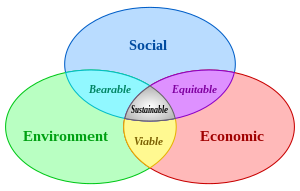From Wikipedia, the free encyclopedia
Green economy includes green energy generation based on renewable energy to substitute for fossil fuels and energy conservation for efficient energy use. The green economy is considered being able to both create green jobs, ensure real, sustainable economic growth, and prevent environmental pollution, global warming, resource depletion, and environmental degradation.
Because the market failure related to environmental and climate protection as a result of external costs, high future commercial rates and associated high initial costs for research, development, and marketing of green energy sources and green products prevents firms from being voluntarily interested in reducing environment-unfriendly activities (Reinhardt, 1999; King and Lenox, 2002; Wagner, 203; Wagner, et al., 2005), the green economy is considered needing government subsidies as market incentives to motivate firms to invest and produce green products and services. The German Renewable Energy Act, legislations of many other EU countries and the American Recovery and Reinvestment Act of 2009, all provide such market incentives.
However, there are still incompatibilities between the UN global green new deal call and the existing international trade mechanism in terms of market incentives. For example, the WTO Subsidies Agreement has strict rules against government subsidies, especially for exported goods. Such incompatibilities may serve as obstacles to governments' responses to the UN Global green new deal call. WTO needs to update its subsidy rules to account for the needs of accelerating the transition to the green, low-carbon economy. Research is urgently needed to inform the governments and the international community how the governments should promote the green economy within their national borders without being engaged in trade wars in the name of the green economy and how they should cooperate in their promotional efforts at a coordinated international level.
Contents[hide] |
[edit]Notes
[edit]See also
[edit]National articles
- Agroecology
- Deep ecology
- Eco socialism
- Ecofeminism
- Ecology of contexts
- Embodied energy
- Embodied water
- Energy Accounting
- Environmental economics
- Environmental ethics
- National enivornmental economics in Japan
- Energy quality
- Exergy
- Green accounting
- Human development theory
- Human ecology
- Inclusive Democracy
- Industrial ecology
- List of Green topics
- Natural capital
- Natural resource economics
- Renewable-energy economy
- Sustainability
- Spaceship Earth
[edit]References
[edit]Further reading
- Kennet M.,and Heinemann V,(2006) Green Economics,Setting the Scene.in International Journal of Green Economics,Vol 1 issue 1/2 (2006)
Inderscience.Geneva
- Kennet M., (2009) Emerging Pedogogy in an Emerging Discipline,Green Economics in Reardon J., (2009) Pluralist education, Routledge.
- Kennet M., (2008) Introduction to Green Economics, in Harvard School Economics Review.
- Common, M. and Stagl, S. 2005. Ecological Economics: An Introduction. New York: Cambridge University Press.
- Daly, H. and Townsend, K. (eds.) 1993. Valuing The Earth: Economics, Ecology, Ethics. Cambridge, Mass.; London, England: MIT Press.
- Georgescu-Roegen, N. 1975. Energy and economic myths. Southern Economic Journal 41: 347-381.
- King, Andrew; Lenox, Michael, 2002. ‘Does it really pay to be green?’ Journal of Industrial Ecology 5, 105-117.
- Martinez-Alier, J. (1990) Ecological Economics: Energy, Environment and Society. Oxford, England: Basil Blackwell.
- Røpke, I. (2004) The early history of modern ecological economics. Ecological Economics 50(3-4): 293-314.
- Røpke, I. (2005) Trends in the development of ecological economics from the late 1980s to the early 2000s. Ecological Economics 55(2): 262-290.
- Reinhardt, F. (1999) ‘Market failure and the environmental policies of firms: economic rationales for ‘beyond compliance’ behavior.’ Journal of Industrial Ecology 3(1), 9-21.
- Spash, C. L. (1999) The development of environmental thinking in economics. Environmental Values 8(4): 413-435.
- Vatn, A. (2005) Institutions and the Environment. Cheltenham: Edward Elgar
- Krishnan R, Harris JM, Goodwin NR. (1995). A Survey of Ecological Economics. Island Press. ISBN 1559634111, 9781559634113.
- Martinez-Alier, J., Ropke, I. eds., Recent Developments in Ecological Economics, 2 vols., E. Elgar, Cheltenham, UK, 2008.
- United Nation Environment Programme (UNEP), 2008a. ‘Global green new deal - environmentally-focused investment historic opportunity for 21st century prosperity and job generation.’ London/Nairobi, October 22.
- Wagner, Ma. (2003) "Does it pay to be eco-efficient in the European energy supply industry?" Zeitschrift für Energiewirtschaft 27(4), 309-318.
- Wagner, M. et al. (2002) "The relationship between environmental and economic performance of firms: what does the theory propose and what does the empirical evidence tell us?" Greener Management International 34, 95-108.
[edit]External links
- The Green Economics Institute-http://greeneconomics.org.uk/
- The International Society for Ecological Economics (ISEE) - http://www.ecoeco.org/
- Green Recovery - http://www.americanprogress.org/issues/2008/09/green_recovery.html
- The International Journal of Green Economics, http://www.inderscience.com/ijge
- Eco-Economy Indicators: http://www.earth-policy.org/Indicators/index.htm
- EarthTrends World Resources Institute - http://earthtrends.wri.org/index.php
- The Inspired Economist.
- Ecological Economics Encyclopedia - http://www.ecoeco.org/education_encyclopedia.php
- The academic journal, Ecological Economics - http://www.elsevier.com/locate/ecolecon
- The US Society of Ecological Economics - http://www.ussee.org/
- The Beijer International Institute for Ecological Economics - http://www.beijer.kva.se/
- Gaian Economics website - http://www.gaianeconomics.org/
- Sustainable Prosperity - http://sustainableprosperity.ca/
- World Resources Forum - http://www.worldresourcesforum.org
- The Gund Institute of Ecological Economics - http://www.uvm.edu/giee
- Ecological Economics at Rensselaer Polytechnic Institute - http://www.economics.rpi.edu/ecological.html
- An ecological economics article about reconciling economics and its supporting ecosystem - http://www.fs.fed.us/eco/s21pre.htm
- "Economics in a Full World", by Herman E. Daly - http://sef.umd.edu/files/ScientificAmerican_Daly_05.pdf
- Steve Charnovitz, "Living in an Ecolonomy: Environmental Cooperation and the GATT," Kennedy School of Government, April 1994.
- NOAA Economics of Ecosystems Data & Products – http://www.economics.noaa.gov/?goal=ecosystems



